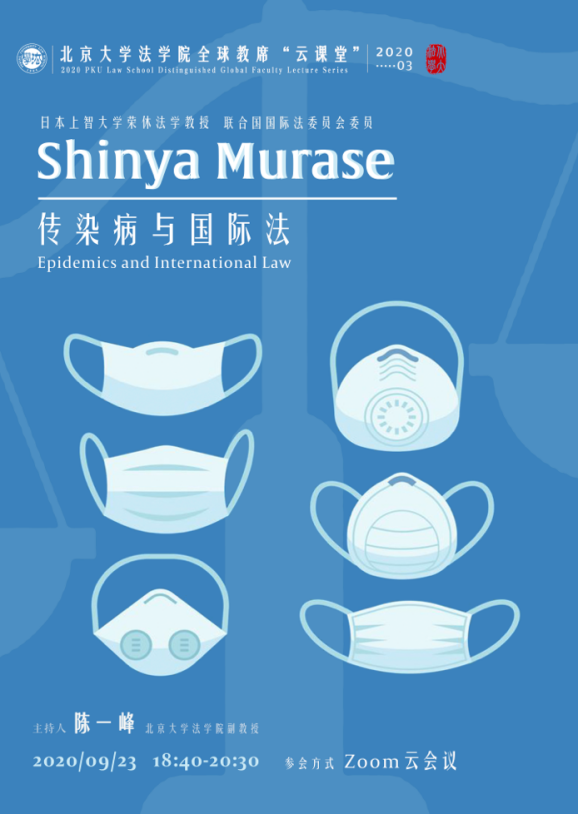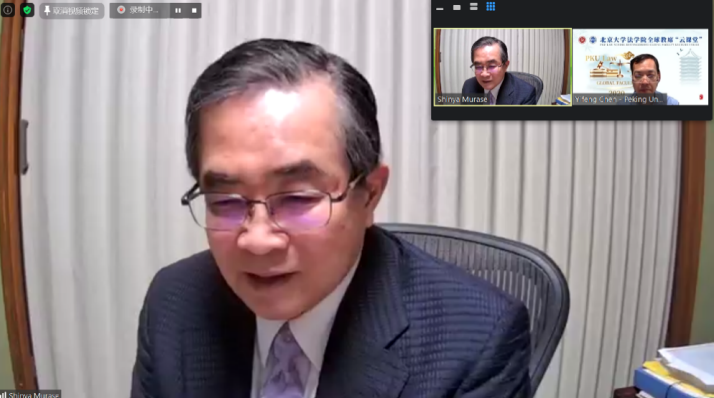Shinya Murase: Infectious Diseases and international law
Date:2020-09-30
On the evening of September 23, 2020, Shinya Murase, global chair of the Peking University Law School and Emeritus professor of law at Sophia University in Tokyo, delivered an online academic lecture on the theme “Infectious Diseases and international law”.
The lecture was hosted by Chen Yifeng, A.P.of Peking University Law School. Zhang Xinjun, Prof.of Tsinghua University Law School, Zhang Maoli, a doctoral student in international law at Peking University Law School, and Huang Yuxiang, a member of the "Epidemiology and International Law" project of the Hague Institute of International Law, served as guests, and nearly 300 students participated and benefited.

Shinya Murase said that infectious diseases affect all aspects of human life. Therefore, we should not only look at infectious diseases from the perspective of international public health law, but from the perspective of general international law, especially human rights law, international environmental law, international trade and investment law, Look at it from the perspective of international traffic law, international peace and security law, and international humanitarian law.
The State has three stages of responsibility in the prevention and control of infectious diseases.Before the outbreak of infectious diseases, the state should make adequate preparations for possible epidemics, take effective measures to prevent the spread of infectious diseases, such as preparing plans in food markets, food transportation, etc., strengthening the training of medical experts and the education of ordinary people. After the emergence of an infectious disease, the country where the epidemic was discovered has the obligation to report within 24 hours and, if necessary, to seek external assistance. Other countries should take preventive measures, such as restricting entry, to prevent the spread of infectious diseases. After the infectious disease is over, the country where the epidemic was discovered should establish a review committee.
In international law, it is very difficult to hold countries accountable for the prevention and control of infectious diseases: First, international law deals with human activities, not natural phenomena such as bacteria and viruses. Second, international law has not yet stipulated the legal responsibility of the state in infectious diseases. Third, the causal relationship between the emergence of infectious diseases and state behavior is difficult to prove. Fourth, force majeure, distress and emergency situations may be invoked to rule out the illegality of state actions. Fifth, even if state responsibility can be established, it will be difficult for the state to control infectious diseases and meet the requirements of stopping illegal acts and guaranteeing no repetition. Dealing with infectious diseases should be the unity and cooperation of the entire international community, rather than holding the country responsible.

Zhang Xinjun believes that field management responsibility requires the state to have due diligence management obligations in the primary rules. It is not only omission that constitutes a breach of obligation, but also an assessment of the subjective elements accompanying omission (culpable negligence), that is, whether the state is aware of the danger of possible damage and whether ( In time) it is possible to prevent damage from occurring. The above assessment is based on scientific principles and requires proof. In terms of responsibilities for the epidemic, based on the current scientific level and people’s understanding of new outbreaks, it is not only difficult to claim the responsibility of the country where the outbreak was discovered, it is even impossible under current laws. Any motion for accountability can only be regarded as a political manipulation and must therefore be avoided.

Huang Yuxiang said that there are two major elements in the accountability of an international organization. One is that an act consisting of an act or omission can be attributed to the organization under international law, and the other is that the act must violate international legal obligations. The difficulty in investigating the responsibilities of international organizations lies in the lack of a clear legal basis for obligations. Facing this obstacle, scholars try to hold the responsibility of international organizations through the goals authorized by international organizations, claiming that violating these goals is equivalent to violating statutory obligations, and role responsibility can be used to explain that international organizations are held accountable for violating their authorized goals. At present, scholars' argumentation on role responsibility is not sufficient, and it cannot explain that the authorization goal of an international organization can be the basis of the obligation to pursue its responsibility.

Zhang Maoli said that the existing dispute settlement mechanism stipulated in the Constitution of the World Health Organization requires that if a case is to be submitted to the International Court of Justice, four conditions must be met: first, whether there is a dispute; second, whether it is an interpretation or application The issue of the Constitution of the World Health Organization; third, whether the dispute has been resolved through advance consultation or the World Health Assembly; fourth, whether the parties concerned choose other dispute settlement mechanisms. In addition, if you seek the International Court of Justice to resolve disputes, you need to deal with the issue of standing. The four conditions set by the World Health Organization are intended to encourage member states to resolve disputes through communication rather than directly resorting to courts. In the field of health law, international cooperation is very important, and countries should avoid intensifying conflicts in the name of rulings. The purpose of the dispute settlement mechanism is to replace war to solve problems, not to provoke war.

Chen Yifeng said that the country where the epidemic was discovered has an obligation to seek external help. Is this obligation mandatory?

Shinya Murase pointed out that The obligation of the country where the epidemic was discovered to seek external help is not mandatory. When Myanmar was hit by Hurricane Nargis in 2008, when the outbreak was triggered, Britain and France sent warships to try to enter Yangon Port to bring back the stranded goods in their country. The Myanmar government rejected the request of Britain and France. This involves the issue of whether the Myanmar government should fulfill its obligation to accept external help. The mainstream opinion of the international community still condemns the actions of Britain and France, because they should send commercial ships instead of warships to deal with cargo issues, and sending warships will be regarded as an intrusive action. Cooperative cooperative action is preferable to intrusive action in the face of natural disasters.
Translated by Wang Xianning
Edited by Wu Yunkai



